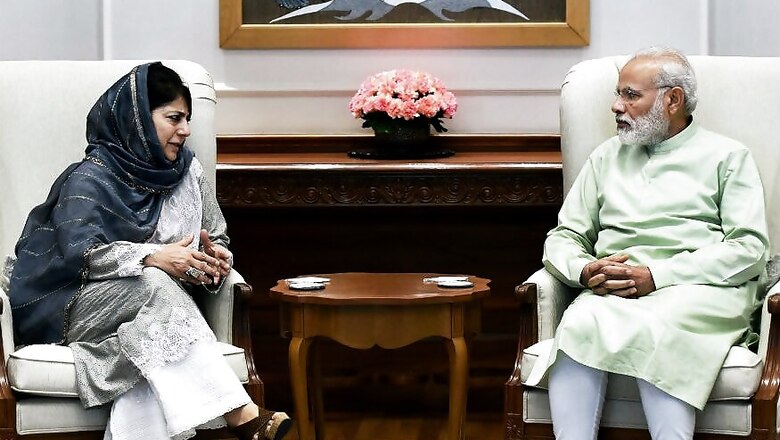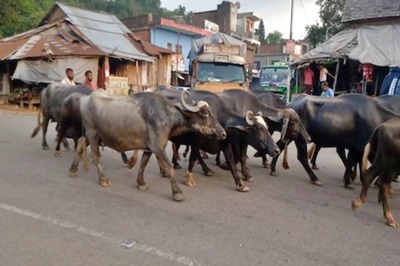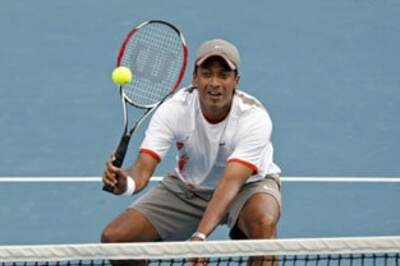
views
 The ongoing controversy over Article 35A is doing more harm to the PDP-BJP coalition in Jammu and Kashmir than a year-long bloody unrest, hundreds of civilian deaths, controversies over pellet guns, the human shield incident, and a cancelled bypoll together couldn’t do.
The ongoing controversy over Article 35A is doing more harm to the PDP-BJP coalition in Jammu and Kashmir than a year-long bloody unrest, hundreds of civilian deaths, controversies over pellet guns, the human shield incident, and a cancelled bypoll together couldn’t do.
The threat of abrogation of Article 35A is leading to unprecedented political developments in the Valley. For instance, it is the first time in recent past that all major political parties in Kashmir, including the ruling People’s Democratic Party and the opposition National Conference, independent MLAs and even the Hurriyat have come together on an issue.
Attorney General KK Venugopal telling Supreme Court, during a hearing on 35A, that the Centre was in favour of a ‘larger debate’ sent alarm bells ringing through the Valley.
Even before an opposition leader could rake up the issue, it was the Chief Minister of the state, and the face of PDP- BJP alliance, Mehbooba Mufti who spoke out against the abrogation of Article 35A in ominous tones.
“(If Kashmir’s special status is tampered with) is jhande ko kaandha dene wala koi nahi hoga Kashmir mein (there will be nobody to shoulder the tricolor),” Mufti had said in a seminar held in New Delhi on July 29.
She followed this up with an unprecedented move, of visiting the senior-most National Conference leader, Farooq Abduallah, to discuss the issue.
Abdullah himself has raised the issue to feverish pitch, threatening an unrest “bigger than the (2008) Amarnath land row” in which around 70 people lost their lives.
Mufti also came to Delhi last week to meet Union Home Minister Rajnath Singh and Prime Minister Narendra Modi. She returned from Delhi with an assurance, as she told reporters, by Modi that the article won’t be tampered with.
The fast-paced developments over Article 35A in Kashmir have also been riveting, thanks to the flip-flops of the BJP’s state unit.
A week after assuring their alliance partner that Article 35A won’t be tampered with, its chief spokesperson Virender Gupta on August 10 said that time had “come for the people of the state to say goodbye to it (Article 370) and also to Article 35A.”
As Supreme Court begins a hearing over Article 35A, it may make sense to dig a little deeper into the article to understand what is causing a major political upheaval in Kashmir and what all is at stake.
WHAT IS ARTICLE 35A?
The article is basically an agreement reached between New Delhi and Srinagar in 1952, added to the Constitution through a presidential order of 1954, according to which no one except the permanent residents will be able to settle permanently in the state, acquire immovable property, avail government jobs, scholarships and aid.
WHO ARE PERMANENT RESIDENTS?
According to the original definition, fixed by the then Maharaja of Kashmir, permanent residents or state subjects were are all those who were born or settled within the state before 1911, or after having lawfully acquired immovable property in the state for not less than 10 years prior to that date and their descendants.
Also, emigrants from the state, including those who migrated to Pakistan, are considered state subjects. Their descendants are also considered state subjects for two generations. But this definition was further modified as Article 35 A was ratified in the Constitution.
At this point, it may also make sense to understand the context in which Article 35A came into being. Some dates are important here.
1927 and 1932
The then Dogra ruler of the state, Maharaja Hari Singh, issued notifications defining state subjects and their rights. It is said that the Dogras from Jammu approached Singh, expressing fears that an influx of people from Punjab would cause them to lose their jobs and land. So the idea behind these notifications was to contain growing Punjabi influence.
26 October, 1947
Maharaja Hari Singh sought urgent military help on October 24 as Afghani marauders, sent by Pakistan, began their rampage. On October 26, he signed the document of accession. Two notable points here. First, the accession by Union of India was only on three subjects — defence, communications and foreign affairs. Second, the final terms of accession weren’t finalised yet.
July 1949
The National Conference founder and the tallest political leader of the Valley, Sheikh Abdullah, began negotiations with the Union of India over the terms of accession.
July 1952
Sheikh Abdullah and Jawaharlal Nehru reached upon some agreements. These came to be known as the Delhi Agreement. One of the points agreed upon by the two parties was that domiciles of Jammu and Kashmir shall be regarded as citizens of India, but the State Legislature was empowered to make laws for conferring special rights and privileges on the state’s subjects.
May 1952
The provision of the state deciding special rights and privileges on its people was added to the Constitution formally through the Constitution (Application to Jammu and Kashmir) Order, 1954, issued by the country’s first president, Rajendra Prasad, on May 14, 1954, through powers conferred by clause (1) of Article 370.
November 1956
The state’s constitution (J&K has its own constitution, its own flag and own penal code) was adopted. It defines a permanent resident as one who was born or settled in the state before May 14, 1954, or who has been a resident of the state for 10 years and has “lawfully acquired” immovable property in the state.
WHAT’S THE CHALLENGE TO IT?
In 2014, a little-known NGO approached the Supreme Court challenging Article 35A on the grounds that it was illegally added to the Constitution as it was never floated before Parliament.
Last month, Supreme Court lawyer Charu Wali Khanna also challenged Article 35A on the grounds that it was discriminatory towards women.
“Article 14 of the Constitution gives a fundamental right to equality before law. But 35A is heavily loaded in favour of males because even after marriage to women from outside, they will not lose the right of being permanent residents,” she told the court.
Her argument was that while a woman from outside the state shall became a permanent resident on marrying a male permanent resident of the state, a daughter who is born state subject will lose her permanent resident status on marrying an outsider.
At this juncture, it may be important to recall a landmark judgment delivered on October 2002, by the Jammu and Kashmir High Court, which held that women married to non-permanent residents will not lose their rights, though children of such women will not enjoy succession rights.
WHO IS SAYING WHAT NOW
There is an outrage among Kashmiri Muslims who consider the abrogation of Article 35A as a means by which the Hindu Right wants to cause deep demographic change in the Valley.
This is the primary objection raised by the Hurriyat. The separatists also called for a bandh on Sunday to protest Centre’s stand on 35A.
Some say that abrogation of 35A is the “permanent solution” to the Kashmir issue, which Union Home Minister Rajnath Singh has often talked about.
Various political parties have also expressed their anger at the fact that the Centre, through its Attorney General, did not end the controversy by underlining that 35A was untouchable.
National Conference
Farooq Abdullah has said tinkering with 35A is tantamount to “playing with fire.” He has threatened violence on a scale bigger than 2008 Amarnath row.
“Agenda of the BJP and the RSS is basically to erode autonomous structure of this state and we as a united front are going to bring this to people, so that they know what the dangerous implications are of the abrogation of Article 35A,” he has told reporters.
His son and former chief minister Omar Abdullah, in a conference held in the capital last month, said a “larger debate” on 35A would necessarily entail a larger debate on the terms of accession of J&K to India.
PDP
Mehbooba Mufti has maintained an absolute unyielding stance on Article 370. Her party, the PDP, and the BJP had signed an ‘Agenda of Alliance’ as a broad framework of what the coalition government was looking to achieve in the next six years in J&K.
A little bit of give-and-take was perceived to have happened as the PDP diluted its stand on AFSPA and the BJP agreed to maintain status quo on Article 370.
On Article 35A, Mehbooba Mufti recalled this ‘promise’ recently. “Our Agenda of Alliance was based on a foundation that the status of Article 370 can’t be altered or fiddled with... so none of us (PDP-BJP) can go against that.”
She also claimed that she had “100% support” from PM Modi on status quo for Article 370.
BJP
The party has always talked about abrogation of Article 370, arguing that these special provisions were temporary in nature, but agreed to maintain status quo in its agreement with the PDP. However, spokespersons and senior leaders have always maintained that Article 35A was “not a sacred cow that cannot be touched”.
Centre
The Centre, in the past several legal challenges to Article 35A, has maintained that the article cannot be tampered with.
This time the central government, through Attorney General KK Venugopal, told the Supreme Court that it wanted a “larger debate” on the issue as it was “very sensitive” in nature. He also asked that the matter be referred to a larger bench given the constitutional issues involved. The court agreed, saying a three-judge bench would hear the matter in six weeks.
Notably, some reports in various newspapers have quoted ‘official sources’ in MHA, saying that the Centre will not take a stand on the issue, leaving it open. Sources have been quoted saying that the A-G only conveyed a factual position on the issue and will not take sides.
(More Sunday Features)




















Comments
0 comment